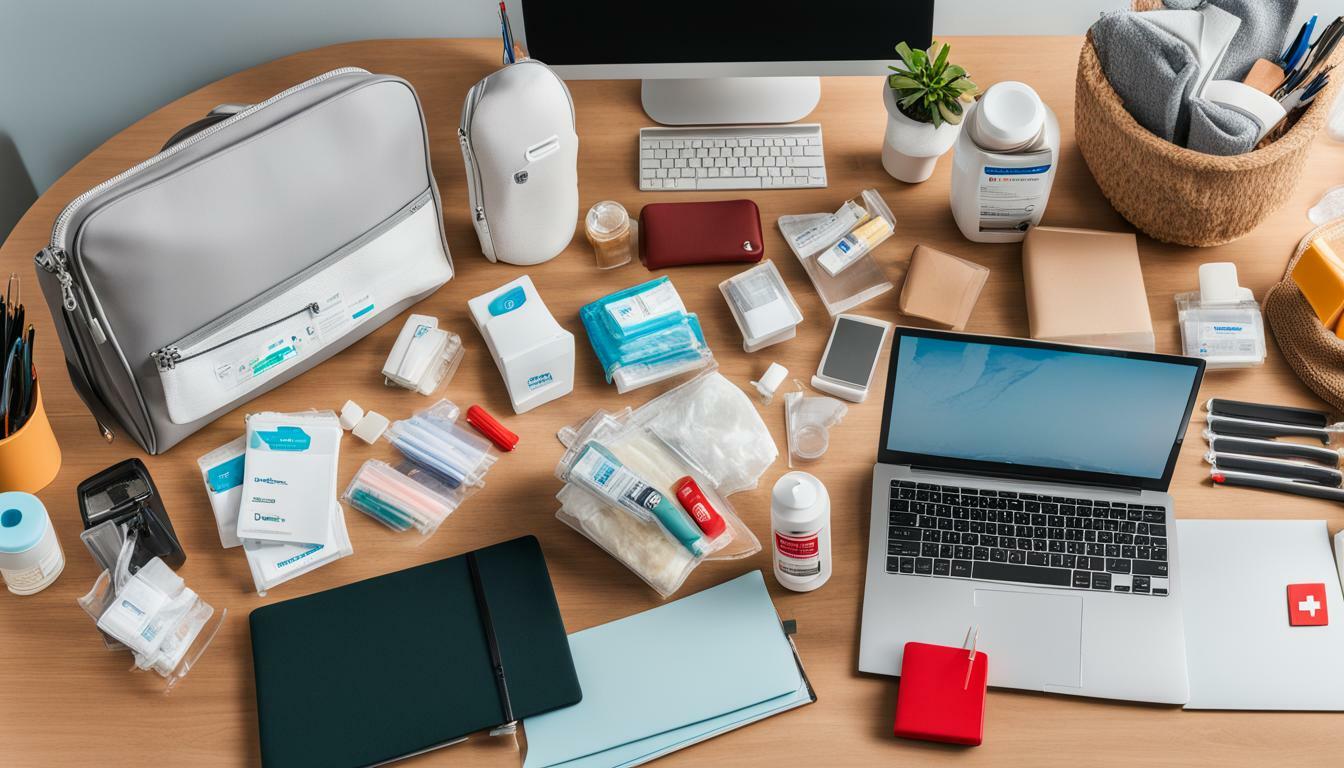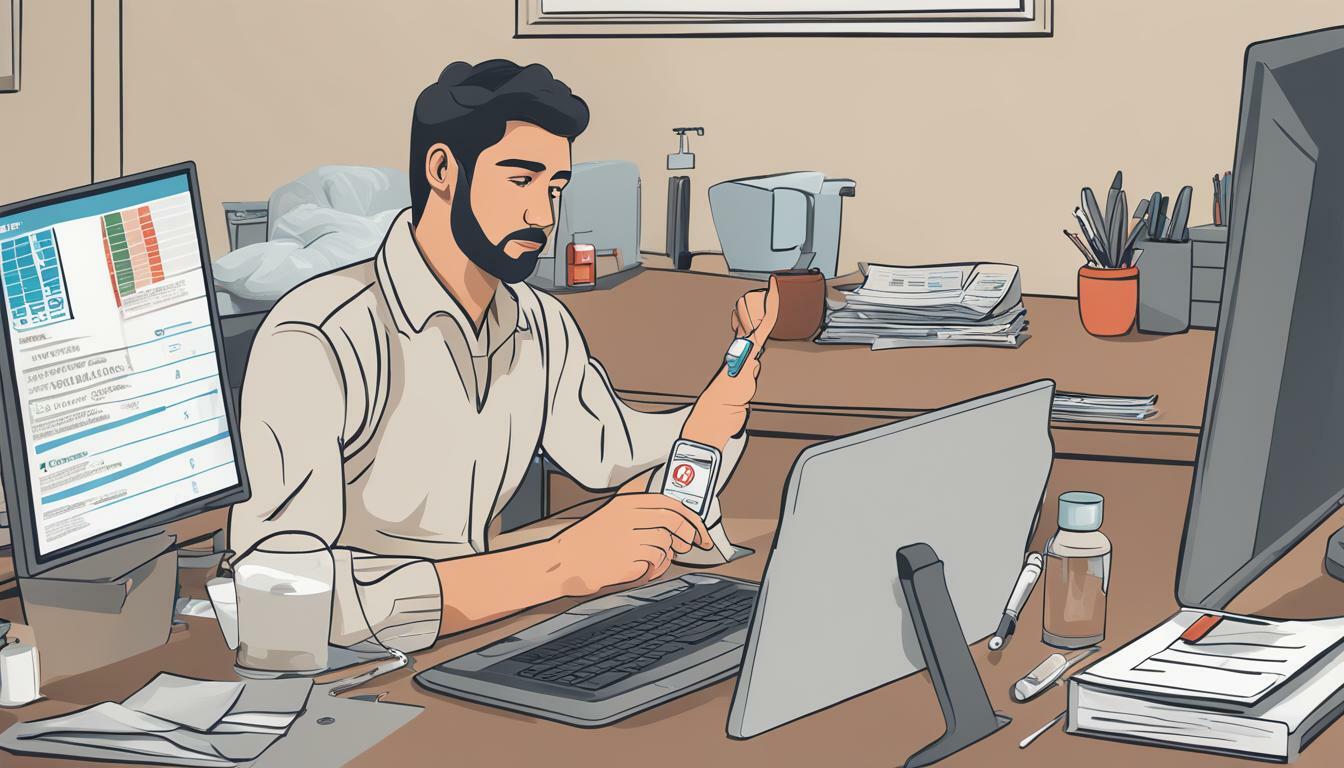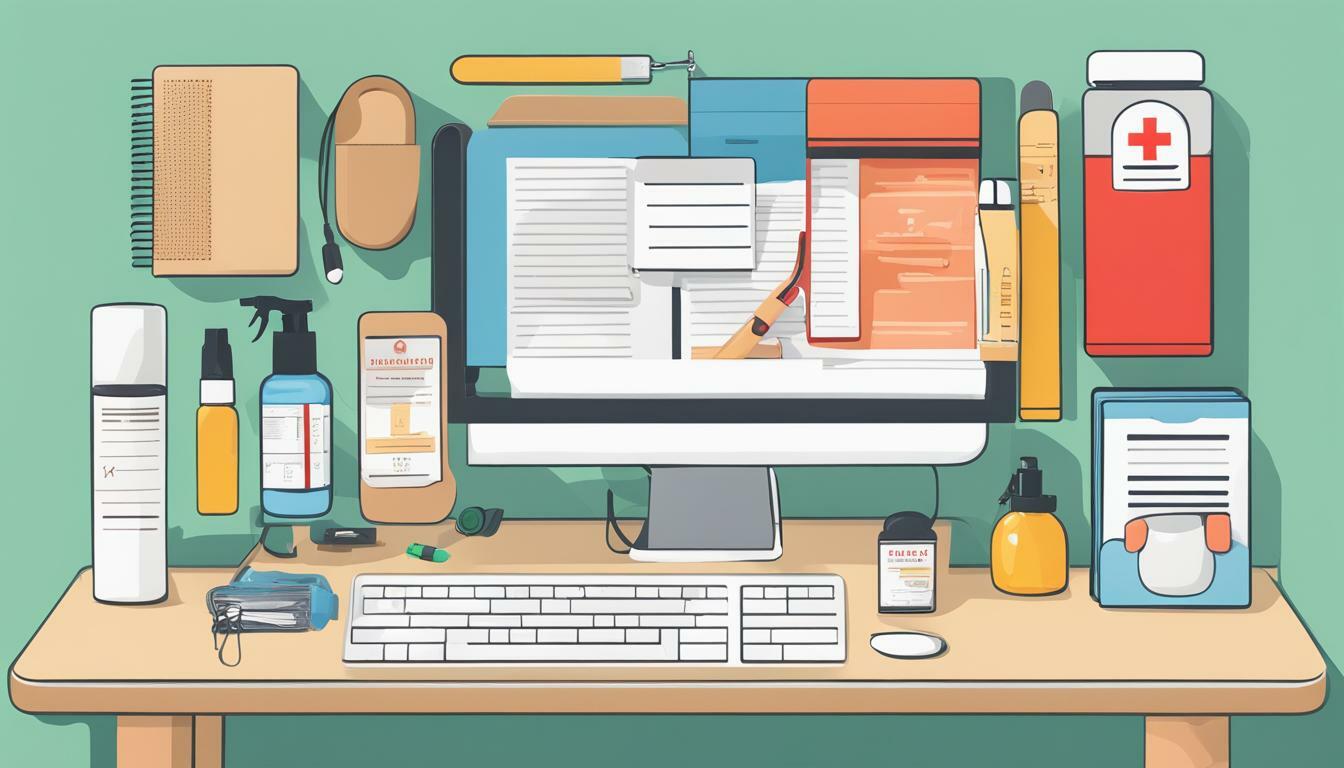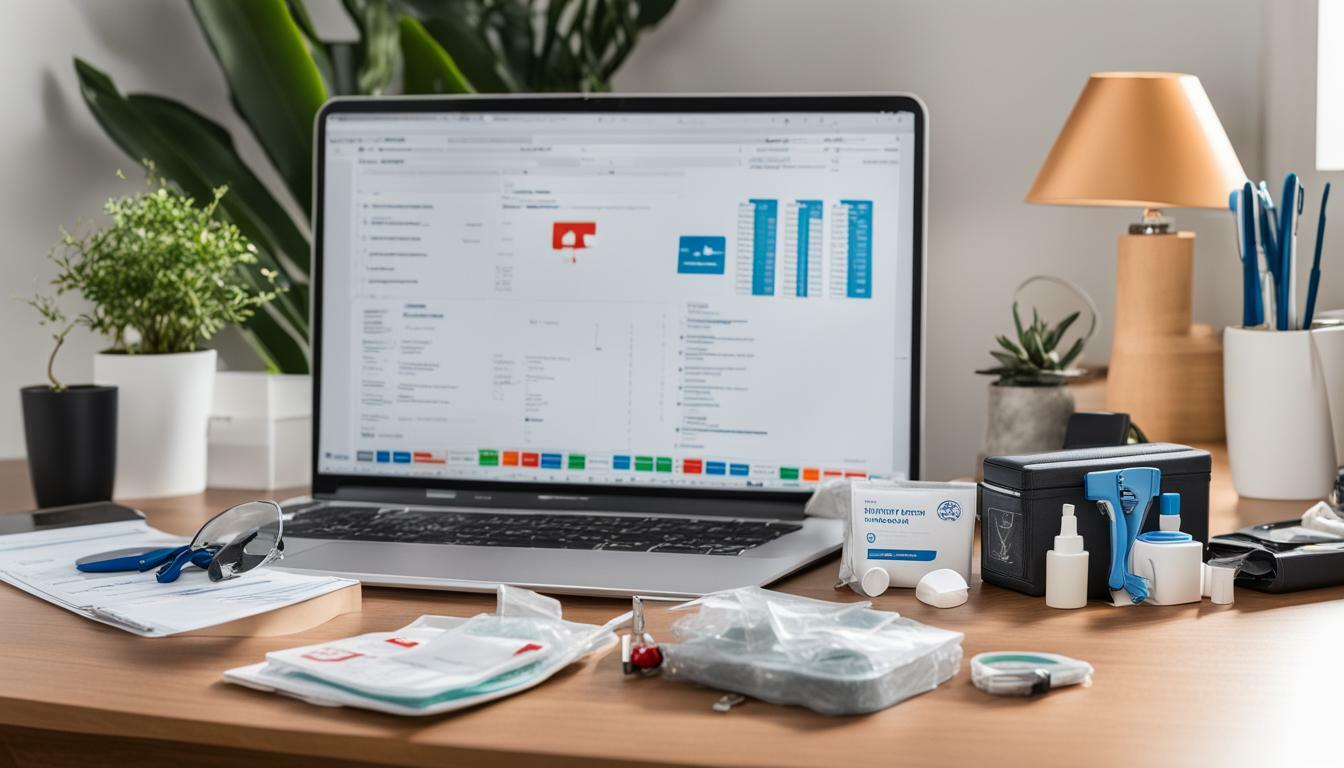As more and more individuals transition to remote work, it is important to prioritize health and safety even when working from home. This includes having the proper first aid supplies and emergency preparedness in case of any health-related situations that may arise. Maintaining a safe and healthy work environment is crucial for remote workers to stay productive and mentally and physically well.
Remote workers may face unique challenges when it comes to health and safety, such as not having access to immediate medical assistance or being alone in their home office. That is why having a first aid kit and other necessary medical supplies close at hand is vital.
Key Takeaways
- Prioritizing health and safety is important for remote workers, even when working from home
- Having a first aid kit and other necessary medical supplies can be life-saving in case of emergencies
- Maintaining a healthy work environment is crucial for remote workers to stay productive and well
Remote Worker Safety: Essential First Aid Items for Remote Workers
As a remote worker, you are responsible for maintaining your own safety, including having the right first aid items in your home office. While you may not have access to a fully stocked first aid kit as you would in a traditional office, there are essential items you should have on hand in case of minor injuries or ailments.
Here are some essential first aid items for remote workers:
| Item | Purpose |
|---|---|
| Bandages | To cover and protect cuts and scrapes |
| Antiseptic wipes | To clean and disinfect wounds before applying a bandage |
| Tweezers | To remove splinters or other foreign objects from the skin |
| Pain relievers | To alleviate minor aches and pains |
| Thermometer | To monitor temperature in case of a fever or illness |
Having these essential first aid items readily available can help you manage minor injuries and ailments in the comfort of your own home office without the need to leave your workspace.
Remember, it is also important to regularly check expiration dates for your first aid items and replace them as needed. You don’t want to find yourself in a situation where you need a certain item only to realize it’s expired.

By taking the time to stock your home office with these essential first aid items, you can prioritize your own safety and be better prepared to handle any minor injuries or ailments that may arise while working remotely.
Creating a Home Office Health Kit: Must-Have Supplies
Working remotely can be convenient, but it can also present unique health and safety challenges. One way to ensure that you are prepared for any potential health-related situations is by creating a home office health kit. Here are some essential supplies that you should consider including in your kit:
| First Aid Supplies | Other Must-Have Supplies |
|---|---|
|
|
These supplies can help you handle minor injuries and ailments quickly and effectively. They can also help you be better prepared for emergencies. Ensure that you have all the necessary items in your home office health kit and check it periodically to make sure everything is up to date and in good condition.
Remember, every home office is different, and you may have unique needs or circumstances. Feel free to add any additional supplies that you think may be necessary for your specific situation.

Remote Worker Emergency Preparedness: Be Ready for Any Situation
As a remote worker, it’s important to be prepared for emergencies that may arise while working from home. Whether it’s a minor injury or a major health issue, having essential supplies on hand can make all the difference. Here are some items to consider including in your emergency preparedness kit:
| Item | Purpose |
|---|---|
| Emergency Blanket | To keep warm in case of power outages or other emergencies. |
| Flashlight | For lighting in case of power outages or to navigate through dark areas of your home. |
| Basic First Aid Manual | To provide guidance in case of minor injuries. |
| Emergency Contact Numbers | To have easy access to important phone numbers in case of an emergency. |
It’s important to keep in mind that emergencies can happen at any time, so having these supplies readily available can help you feel more secure while working from home.
Additionally, it’s important to ensure your home office is equipped with a working smoke detector and carbon monoxide detector to prevent fire and other hazards.
Remember, being prepared is the key to staying safe in any situation.

Prioritising Remote Work Health and Safety
Remote work has become increasingly popular in recent years, and with the ongoing pandemic, it has become the norm for many individuals. While there are many benefits to remote work, such as increased flexibility and autonomy, it’s important to prioritize health and safety while working from home.
One key aspect of remote work health and safety is proper ergonomics. Sitting at a desk for extended periods can lead to a range of work-related injuries, such as back pain, neck strain, and carpal tunnel syndrome. It’s important to maintain good posture, take regular breaks, and incorporate stretching exercises into your routine to prevent these issues.
Mental health is also an essential factor in remote work health and safety. Studies show that remote workers are more likely to experience feelings of isolation and burnout than office-based workers. It’s crucial to prioritize mental health by taking breaks, socializing with colleagues, and seeking professional help if necessary.
In addition to ergonomic considerations and mental health, it’s essential to have a well-stocked first aid kit and emergency plan in place. This can help ensure that you’re prepared for any health-related situations that may arise while working remotely.
By prioritizing remote work health and safety, you can ensure that you’re able to perform at your best and avoid common health issues associated with remote work.

Benefits of First Aid Training for Remote Workers
Remote workers face unique challenges when it comes to health and safety, especially in emergency situations. Knowing how to properly administer first aid can make all the difference in these instances. First aid training equips remote workers with the knowledge and confidence to act quickly and effectively in a crisis, potentially saving lives.
Basic first aid training covers a wide range of topics, including treating cuts, burns, and fractures, performing CPR, and managing shock and other medical emergencies. By undergoing this training, remote workers can learn how to handle minor injuries and illnesses, as well as more serious emergencies that may require immediate medical attention.
Aside from the practical skills gained, first aid training also instils a sense of responsibility and preparedness in remote workers. It promotes a culture of safety and helps to prevent accidents from occurring in the first place by identifying potential hazards and risks.
Additionally, first aid training can provide remote workers with a sense of confidence and peace of mind, knowing that they are well-equipped to handle any emergencies that may arise. This can help to reduce stress and anxiety, leading to improved overall well-being.
Online first aid courses tailored specifically for remote workers are available, making it easy and convenient for individuals to receive the necessary training. By investing in first aid training, remote workers can enhance their skills, promote safety, and ultimately protect themselves and their colleagues.
Benefits of First Aid Training for Remote Workers:
- Ability to act quickly and effectively in a crisis
- Knowledge of basic first aid skills
- Culture of safety
- Reduced stress and anxiety
- Convenience of online training options

Essential Remote Worker Medical Supplies
When it comes to working from home, it’s easy to neglect the importance of having essential medical supplies readily available. However, accidents and injuries can happen at any time, so it’s crucial to stay prepared.
Aside from the basic first aid items, there are a few medical supplies that every remote worker should have in their home office:
| Medical Supplies | Why They’re Important |
|---|---|
| Thermometer | Having a thermometer on hand can help monitor your body temperature and detect any signs of fever or illness. |
| Over-the-counter medications | It’s always a good idea to have basic medications on hand, such as pain relievers and cough and cold medicines, to address any minor illnesses or discomforts. |
| Personal prescriptions | If you have any prescriptions that you take regularly, make sure to have them readily available in your home office. |
Having these medical supplies on hand can provide peace of mind and ensure that you’re prepared for any health-related situations that may arise.

Remember, taking care of your health should always be a top priority, even when working from home. By having these essential medical supplies readily available, you can ensure that you’re prepared for any health-related emergencies and can continue to work efficiently and comfortably.
Maintaining a Healthy Remote Work Environment
Working from home can present unique challenges to maintaining a healthy work environment. However, there are several steps remote workers can take to ensure they are creating a healthy and productive workspace.

One important factor to consider is proper ventilation. It is essential to ensure fresh air is circulating in your workspace. Opening windows or investing in an air purifier can help with air circulation and reduce the risk of respiratory illnesses.
Another aspect to consider is natural lighting. Exposure to natural light has been shown to improve mood and increase productivity. Therefore, position your workspace in a spot where you can benefit from natural light. If natural light is not available, invest in a daylight lamp.
Ergonomic furniture is also crucial to maintaining a healthy work environment. An ergonomic chair and desk can help prevent back, neck, and shoulder pain. They can also increase productivity by allowing you to work comfortably for more extended periods of time.
In addition to physical aspects, it is important to incorporate healthy habits into your remote work routine. Regular exercise is critical for maintaining physical and mental well-being. Taking breaks throughout the day, stretching, and going for a walk can help you avoid burnout and maintain focus.
Creating a healthy work environment can improve your overall productivity and well-being. By taking proactive steps to ensure a healthy remote work environment, you can reduce the risk of work-related injuries and increase your overall job satisfaction.
Remote Worker Safety Essentials: A Checklist for Every Home Office
Working remotely means that you are solely responsible for your own safety and well-being. It’s essential to have the necessary supplies and equipment to handle any medical emergency that may arise. Here is a checklist of remote worker safety essentials that you should have in your home office:
| Item | Reason |
|---|---|
| First Aid Kit | For treating minor injuries and illnesses |
| Emergency Contact List | To quickly access important phone numbers in case of an emergency |
| Fire Extinguisher | To be prepared for a fire emergency |
| Smoke Detector | To alert you in case of a fire |
| Carbon Monoxide Detector | To detect any carbon monoxide gas that may be present |
| Flashlight | To see in the dark in case of a power outage or other emergency situation |
| Emergency Blanket | To keep warm in case of a power outage or other emergency situation |
| Basic First Aid Manual | To reference in case of a medical emergency |
| Thermometer | To take your temperature if you’re feeling unwell |
| Over-the-Counter Medications | For treating common ailments such as headaches, fever, and allergies |
| Personal Prescriptions | To have on hand if you need to take medication regularly |
| Ergonomic Equipment | To promote good posture and reduce strain on your body during extended periods of sitting |
| Exercise Equipment | To stay active and healthy during the workday |
Having these essential items in your home office will help you be better prepared for any emergency situation that may arise. Remember to regularly check and maintain your supplies to ensure they are still in good condition and replace any items that have expired or been used.

Stay safe and healthy while working remotely!
Conclusion
As remote work becomes increasingly popular, it’s important for individuals to prioritize their health and safety while working from home. A crucial aspect of this is having a well-stocked first aid kit with essential supplies readily available.
Remote workers should ensure they have basic items such as bandages, disinfectants, and pain relievers, but also specific supplies like adhesive tapes, antiseptic wipes, and tweezers. Additionally, emergency preparedness items like emergency blankets, flashlights, and a basic first aid manual should be on hand.
However, maintaining health and safety goes beyond first aid kits. Remote workers must practice good ergonomics, take breaks, and prioritize mental health and stress management. It’s also important to have essential medical supplies like a thermometer and over-the-counter medications.
Creating a healthy remote work environment involves proper ventilation, natural lighting, ergonomic furniture, regular exercise, and healthy eating habits. Investing in first aid training can also be beneficial for remote workers.
Remote Work Health and Safety Checklist
- Well-stocked first aid kit
- Emergency preparedness items
- Ergonomic equipment
- Medical supplies including a thermometer and over-the-counter medications
- Proper ventilation and natural lighting
- Ergonomic furniture
- Regular exercise
- Healthy eating habits
- First aid training
Overall, remote workers must take proactive steps to ensure their health and safety in a home office environment. By following the guidelines in this article, individuals can create a safe and healthy workspace that promotes productivity and well-being.
Remember, a healthy remote worker is a happy and productive remote worker.
